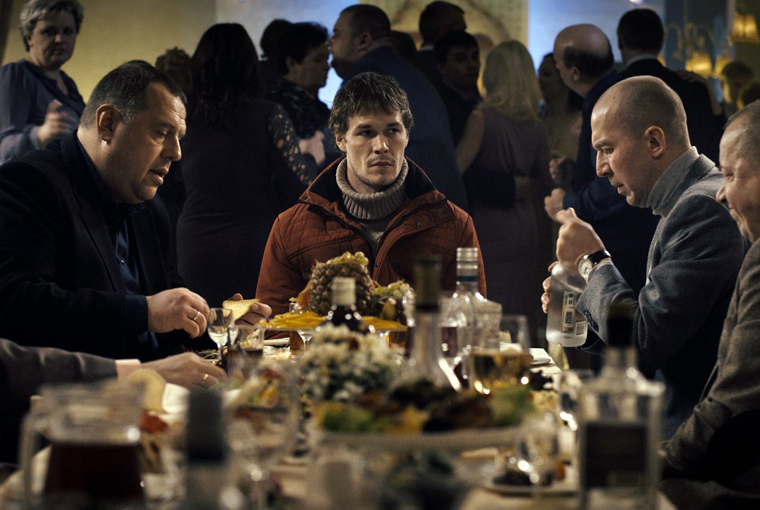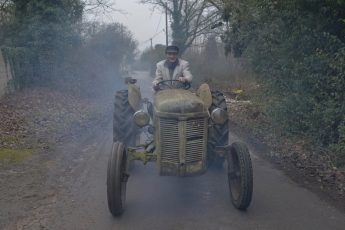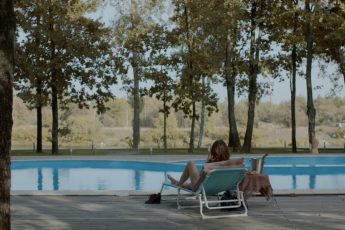
In the iconic novel The Master and Margarita, news of a man’s death interrupts a party where “[…] waiters carry foaming mugs of beer over the dancers’ heads,” cymbals crash and jazz musicians wail “Hallelujah!” as someone shouts orders through a megaphone, “sweat-covered faces seem to light up,” and Soviet cultural elites dance: “In a word, hell.” This terrible news of death causes a shock. But then:
Yes, a wave of grief did arise and lasted for a time, but then it began to subside and one fellow had already returned to his table and, furtively at first, but then openly downed some vodka and taken a bite to eat. And indeed, why waste suprême de volaille? After all, we are alive!1
Mikhail Bulgakov’s “hell” is alive and well in Yuri Bykov’s The Fool, which, for a time, sustains a similarly apocalyptic feel. Music pounds, political elites dance and drink until they vomit while the world outside literally crumbles, starting with forty-year-old residential high-rises that have been drained of money and resources.
Superficially, there are few other similarities between the Stalin-era Moscow novel and the film, but for the fact that a housing crisis lies at the center of both. The novel depicts a corrupt, venal, hypocritical society squeezed together in too few apartments while an overclass lives in luxury; in The Fool, the predatory relationship of the rich on the poor is more clearly spelled out: the mayor and her municipal employees have spent years embezzling the money that should have been allocated for renovations. After being called to fix a pipe that burst in the midst of a vicious domestic quarrel, a plumber named Dima Nikitin – this is our “durak” or fool – realizes that one building is about to collapse. His attempts, not to seek justice, but simply to save lives, force the politicians to choose between ordering an evacuation or keeping their financial crimes hidden. In Russia’s current cinematic climate, it’s clear from the start what the outcome will be.
Yet if we can compare the two works despite more than eighty years between them, a core persists that points, perhaps, to the resilience of a moral tradition in Russian literature and cinema. People live in a squalid, hopeless environment where pleasure, for ghettoized teenagers and elites alike, means drinking to the abandonment of the senses. The poor are “treated like animals and no one does anything,” as Dima laments. As the Satanic character Woland pensively notes in Master and Margarita, the people of Moscow “are thoughtless…the housing shortage has had a bad effect on them.”2 Each work, however, presents its characters with clear moral choices. Dima’s incorruptibility and unselfishness – despite his being reviled constantly as a fool – prove the irrelevance of environmental pressures on morality. When he realizes that the mayor, Nina Galaganova, will cover up the problem at all costs, he risks his life, bodily dragging the inhabitants of the doomed building onto the street. The authorities, by contrast, progress from denying the incontrovertible, to violently accusing one another, to halfheartedly attempting a rescue, to saving their own skins by plotting murder. But between these two extremes, we have the victims themselves, who have simply deteriorated along with their surroundings. If a contagious moral weakness can be blamed, the denizens of the high-rise have as clear a choice before them as do the elite: turn against the one who wants to save them, or finally acknowledge that something is terribly wrong.
The Fool has been criticized as “sometimes laughably on-the-nose”, but Russian cinema has a precedent for such simplicity. It does not deny the existence of more nuanced dilemmas in the world, but sets up a hypothetical, like a moral equation with only two possible outcomes. To seek complex psychology in these dramas is counterproductive. There are many ways to do wrong – even by simply coexisting with depravity – and sometimes only one way to do right. And sadly, unlike in the quote from Doctor Faustus that opens The Master and Margarita, there is no force that “forever wills evil and forever does good.” There are only fallible consciences and powerless fools.




Leave a Comment